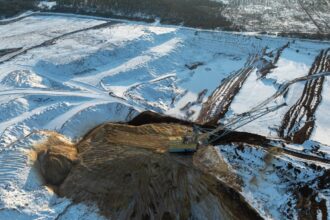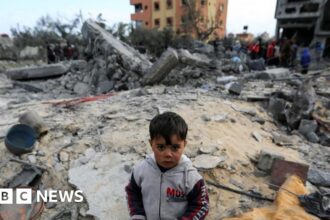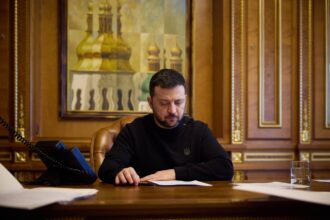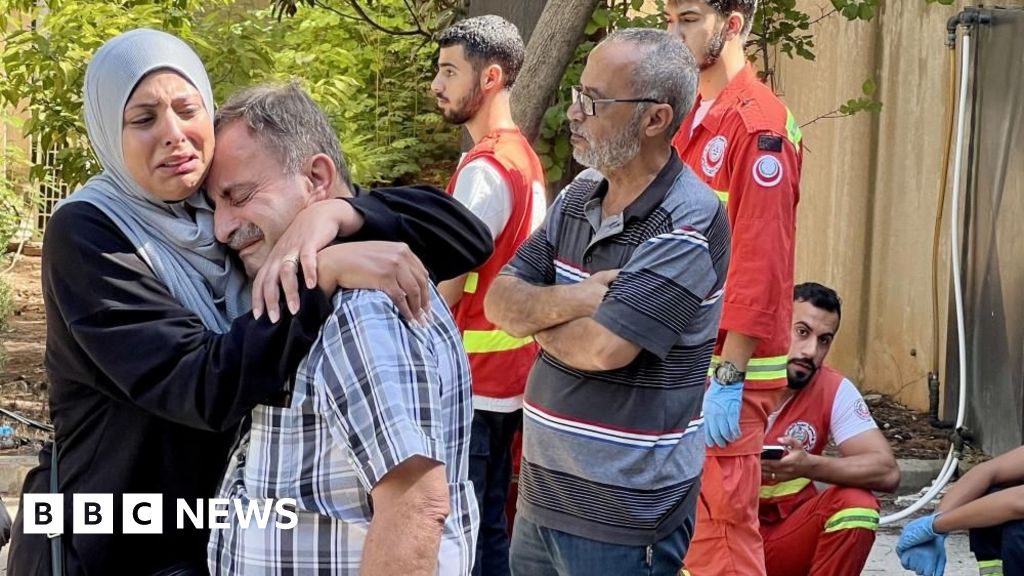Since Israel escalated its offensive last month against Hezbollah, it has targeted medical centres, hospitals and search-and-rescue units in Lebanon.
The attacks have resulted in the deaths and injuries of dozens of emergency workers and medics, and have cut off large swathes south of the border from emergency services and healthcare.
One organisation has been affected more than others. Hezbollah-funded Islamic Health Society (IHS) operates emergency services, hospitals, and medical centres throughout the country.
Bilal Assaf is the head of media relations for IHS Civil Defence. He said that as of Friday, there were more than 150 injured and 85 dead members of staff.
According to the Lebanese Ministry of Health, Israel struck the Baraachit Emergency Centre, located in southern Bint Jbeil, just after midnight on the 7th October, killing at least ten firefighters.
In the hours leading up to the attack, firefighters in Baraachit, part of IHS Civil Defence’s emergency services, faced a difficult dilemma.
Israeli forces no longer allowed the team to carry out missions. There were still civilians present, including some who refused leave.
“Each time they went outside, they would hit near the vehicle,” says Mr Assaf.
The firefighters decided to split; some would go north to Nabatiyeh and others would remain and decide whether to relocate the next morning.
“Unfortunately, the people didn’t survive to see the morning,” Mr Assaf said.
An Israeli air strike in the early morning hours of Monday destroyed the building they were staying.
The Lebanese Health Ministry denounced the strike.
In a press release, it said that the Israeli enemy had added a new war crimes against firefighters and rescuers in south Lebanon. They displayed unmatched violence and a lack of humanity by targeting people engaged in humanitarian search and rescue missions.
The Lebanese Red Cross visited the site a few hours after the attack and found eight dead bodies.
According to Mr Assaf, there were still more under the rubble but the search and rescue teams couldn’t get to the site.
He tells me that even days after the attack the remains of several firemen are still under the debris.
IHS medics, volunteers and government are providing support to those affected by the mass displacement crisis in Lebanon caused by Israeli strikes.
In one of the many schools in Beirut that have been converted into shelters, hundreds who have fled Israeli attacks on the south and southern suburbs of Beirut are trying to make themselves comfortable.
Some faces, bored or curious, glance down at the scene below before disappearing back to their rooms.
Some children are playing with footballs and others with bicycles in the schoolyard.
Several young men gather in front of our camera to complain about water shortages. Some of the adults smoke their shishas. This is a popular pastime for long and uncertain waiting times.
Overhead, the drone‘s constant hum is a new norm in Beirut.
“Everyone knows someone who has been martyred”
Ali Freidi, the director of the IHS health centres, told me that they had deployed doctors, nurses and therapists to help the increasing number of displaced people.
He acknowledges that the IHS services are under immense pressure, both from the needs of the displaced and the strikes by Israel on their colleagues who work in emergency services.
He says, “We are part and parcel of society.” “Everyone knows a martyr.”
Batoul Hammoud is a 25-year-old school teacher who volunteers with the IHS Civil Defence.
She and her fellow volunteers are trying to find out how they can assist.
The most urgent need is medicine. Many people left home without taking their medication.”
She says that the IHS provides routine daily services such as monitoring blood pressure for the elderly among the displaced.
“As a school teacher, I can offer some psychological support to the children, organise a few activities, or simply talk to them, and calm them down.”
The IHS was founded in the early 1980s, during a civil conflict, an Israeli occupation of southern Lebanon, and the breakdown of the Lebanese state.
The government granted a license and it is currently operated in coordination with the Ministry of Health.
It also has agreements to run medical centers and emergency services with municipalities.
The health service has been hit harder than any other organisation in the country.
Nine people were killed and 14 injured when Israel attacked a centre of the IHS located in the heart Beirut on 3 October.
The majority of those killed in the attack were paramedics and civil defence workers who had just returned from a search and rescue mission in southern suburbs where Israel had heavily bombarded.
Seven medics were killed the next day in an Israeli airstrike on two IHS ambulances at the entrance of Marjaiyoun Hospital, located in the south. The hospital was shut down on that day.
On the same day, Israeli forces also struck the Salah Ghandour Hospital run by IHS in Bint Jbeil and injured several doctors and hospital personnel. The hospital ceased operations after the attack.
The director of the Hospital, Dr Mohamad sleiman, told that the hospital was still functioning well, despite all the fighting around it.
“We had medicines and equipment.” The government plan was working. The day of the accident, we had no shortages. “We just need safety,” said he.
Who among us will not be here tomorrow?
The Israeli military has made several statements accusing Hezbollah that it uses medical vehicles to transport fighters, weapons and explosives.
It described its attack against the Baarachit Emergency Centre, as “a precise, intelligence-based attack on several Hezbollah operatives who used a firestation as a military station during combat”.
Hezbollah was also accused of “systematic abuse” of civilian infrastructure.
The strike on the HIS center in central Beirut was said to have targeted “terrorist assets”.
On Sunday, an Israeli military spokesperson claimed that they had “discovered recently that Hezbollah members are using ambulances to carry saboteurs” and weapons. They also threatened that they would take “the necessary steps against any vehicle transporting gunsmen”, no matter what type of vehicle.
After the attack on the medical center in Beirut, EU’s chief of foreign policy said: “Not just civilians are victims, but they also lack emergency care.” I condemn this violation of International Humanitarian Law.”
Mr Assaf is the spokesperson for the IHS Civil Defence. He says that the IHS has no military role. He also accuses Israel, of striking emergency services where they want to drive civilians out.
He says that “up until two weeks ago, there were still some people living in Bint Jbeil.”
“Our presence reassured [them] to a certain degree.” Our guys took care of them and even brought them food.
“Let’s say for the sake argument that they’ve seen us [weapons], then why are they hitting another emergency service?
The UN reported on Friday that more than 100 medics and emergency personnel have been killed in Lebanon, since the beginning of the conflict between Hezbollah (the Hezbollah-Israeli group) and Israel a year ago.
The World Health Organization reported that since September 17 there have been 18 attacks in Lebanon on health facilities, resulting in the deaths of 72 health workers.
The Lebanese Health Ministry has confirmed that the Islamic Risala Scout Association, affiliated with the Amal party (an ally of Hezbollah), as well as the Lebanese Red Cross and Lebanon’s Civil Defence service run by the interior ministry, were among the teams affected.
Many now see parallels between Israel’s year-long campaign in Gaza and its onslaught on Lebanon, with the escalating attacks against emergency services and the buildings that house the displaced and the crowded neighbourhoods of Beirut.
Last week, an UN commission of inquiry stated that Israel had “conducted a concerted campaign to destroy Gaza’s health care system”.
The commission accused Israel of “committing war crimes and crimes against humanity by exterminating medical personnel and facilities with relentless and deliberate attacks”. Israel rejected the findings of the commission.
Many here are concerned that the carnage in Lebanon may only be the beginning.
The IHS staff and volunteer struggle to do their job under pressure. They are a mixture of pain and defiance.
“At night, when we eat together, we look each other in the eye, wondering who will not be here tomorrow,” says Mr Assaf.
I ask him if he believes they may have to suspend operations if the Israelis continue to hit them.
“They will certainly continue to hit us.” “We will never stop.”
Mr Freidi who runs IHS medical centers insists that they “won’t leave the people”.
“These are our people that were forced to leave their country.” We will serve them until our last breath.”
Ms Hammoud is a teacher and IHS volunteer who shares these sentiments.
It’s hard to target people who help others. These people shouldn’t be targeted.”
She smiles and says, “What God decrees, will happen.”
“If God grants martyrdom to us, then praise God.” We will die as martyrs of the Civil Defence of the Islamic Health Society.”
Read More @ www.bbc.com




